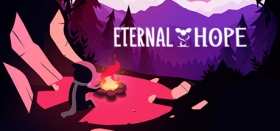
Is Eternal Hope original?
Eternal Hope by developer Double Hit Games was released back in 2020 for PC but has only recently come to consoles. Prepare for a sad, beautiful, black silhouette 2D puzzle platformer.
The player takes on the role of Ti’bi, a small boy who is one of the last of his species. The first few minutes of the game are very emotional. Double Hit Games did a fantastic job of conveying intense feelings of depression and loneliness without the protagonist ever speaking a word. Soon Ti’bi meets another of his kind, someone with whom he can find love and companionship. However, it ends in tragedy as the two are soon separated by a fatal storm. Thrown back into his loneliness Ti’bi encounters a masked spirit, and a bargain is struck; if Ti’bi collects the separated parts of his beloved's soul the spirit will bring her back to life.
The player then begins a journey through forests and temples all coated in a black silhouette forefront. Figuring out the puzzles of these environments is the only way to progress forward.

Eternal Hope
Several 2D platformers have used the darkened silhouetted style, the most famous being developer Playdead’s 2010 platformer, LIMBO. It is that title that I was also reminded of the most while playing Eternal Hope. The slower puzzle-solving gameplay felt like a near copy, and the creepy tone of the game was equally similar. Because of this, it is LIMBO to which we will compare for this article.
In LIMBO you take on a recently deceased little boy (nameless); the player guides the protagonist through the strange setting of Purgatory, dealing with traps and puzzles in an attempt to find his sister. So right away we have a similar theme of finding a loved one who is lost to us. Though in LIMBO our silent character conveys most of the story through actions rather than narrative text or a cinematic storyboard to fill in the gaps. While we have two stories about death, loss, and searching for a loved one, the manner in which these stories are conveyed to us is slightly different when comparing the two games.

LIMBO
The way LIMBO and Eternal Hope deal with the player's death is identical. When you die the game reloads very close to where you met your end allowing you to try again. Both games are deceiving in how hard they can be. Perhaps it is because our protagonists do not double jump, sprint, or flip around like an acrobat. I think the slowness of the games lured me into feeling like I was in control. When a harder puzzle came along that confidence would get me killed.
Both games require patience and logic in order to progress. These are not games I would try and run through in a sitting. Though the games both have a playtime of about three hours, my patience would run out and death would come for me.
One of the more distinguishing mechanics of Eternal Hope is that of the shadow world. The protagonist gains the power to temporarily shift into the shadow world and reveal objects and creatures otherwise unseen. The ability has a recharge-meter and once it's empty you will be kicked back into the regular world. Transitioning between worlds can make some of the objects of the opposing world not interactable. This can include the platforms you are standing on.
But are a few lines of written narration, and the shadow world mechanic enough to distinguish Eternal Hope from LIMBO? In my opinion no, not really. They are basically the same game, with Eternal Hope just being newer and having some colour rather than being done in all greyscale. It should also be noted that Eternal Hope has a conclusive ending to its story, whereas LIMBO does not. Which is pretty fitting for a game called LIMBO, but also creates a sense of accomplishment for the player on Eternal Hope's part.
As memorable/emotional as Eternal Hope can be, it falls short of being original in its genre. It is not that I did not enjoy the game, nor is it necessary for every game to be the best in its genre. The problem was, Eternal Hope was clearly trying to be the next LIMBO. Its puzzles, pace, and tone all reminded me inescapably of that game. As it stands, both are great little platformers, but you don't need to play both in your lifetime. Pick one or the other. You will come away with identical playtime and a mostly similar experience.









COMMENTS
Marjorie Jones - 03:56pm, 9th October 2022
Good article